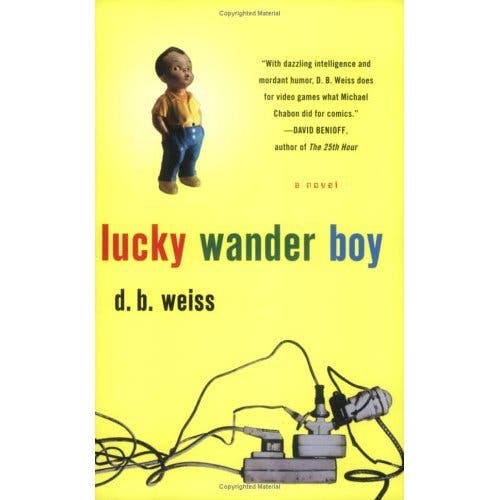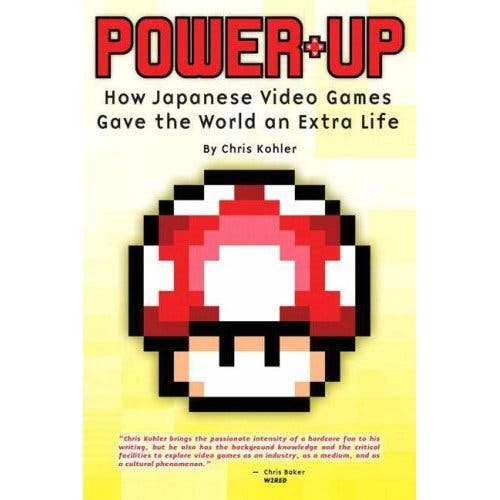Books About Videogames
Lots of things you probably haven't read, and some you should.
Anybody who's ever dropped their Virtual Boy in the bath will know the sad truth: there are some places gaming can't go.
That's where books come in. Aren't books great? They're cheap, plentiful, and you can take them practically anywhere, with no nasty consequences (unless the book in question is a Gutenberg bible, in which case you should probably be prepared to take a few rounds in the back from overzealous security guards). But why stop there? Why not combine activities, and ensure what you're reading is a book about videogames?
I've spent the last few months looking at a handful of the best titles available. This isn't an exhaustive list, and I haven't mentioned game tie-ins or strategy guides or, by and large, art books. But it does contain a couple of genuine classics, and will hopefully ensure that you never have to take Dostoevsky or Dom DeLillo on the morning commute. After all, you won't learn anything about Howard Lincoln's strategy for fighting Universal's Donkey Kong lawsuit reading Underworld, unless it's in the subtext somewhere.
Novels
Despite six thousand years of the written word, there is precisely one really good novel about videogames that I'm aware of. It's hardly surprising that it took so long. First, novels had to be invented. Then, videogames had to be invented. Finally, videogames had to become sufficiently respectable for novelists to consider writing about them.

Happily, DB Weiss couldn't be bothered to wait for that. His book's called Lucky Wander Boy, and concerns a twentysomething's search for a classic arcade game. Although the narrative starts off exploring blokeish Nick Hornby territory, it then takes a handful of unexpected left turns and ends up somewhere far more mysterious. It's funny, it's clever, it's got a lot to say about why Pac-Man's good and Double Dragon isn't, and last time I checked, it was out of print. For shame.
Swirling and multiplying in Lucky Wander Boy's wake, at least a couple of other fiction writers have tackled gaming. Complicity, by Iain Banks, features a made-up strategy game, but is still mainly about the hypocrisy of the left. Then there's JPod, a spry Douglas Coupland ramble about life working for a thinly-fictionalised EA studio, and Charlie Stross's Halting State is a very readable crime thriller partly set inside an MMO. All are readable, but none have Weiss's mixture of analysis and invention. Neal Stephenson's Snow Crash is also worth a read, assuming you can forgive the Metaverse for inspiring Second Life.
While he may not be writing novels about videogames, Martin Amis has at least written something about them. Invasion of the Space Invaders is desperately hard to get hold of, changing hands on the internet for the kind of money you might expect to spend on Radiant Silvergun. I had to claw my copy out of the broken, lifeless fingers of a fallen enemy, and if I ever had to get another, it would probably involve one of those movie montage treks across the planet, including a lengthy stumble over the crest of a blizzardy snowplane, and a fight with at least one wildebeest. Either that or eBay.
Invasion is a bit of a departure for Amis: it's not filled with nasty sex or the lives of disenchanted Londoners, yet it's still interesting to see what the author of Dead Babies thought of Defender (he liked it) and whether he reckoned Donkey Kong would stand the test of time (he didn't).
History

Steven L Kent's detailed and enthusiastic Ultimate History of Videogames is the obvious starting point here. Opening with the birth of Nintendo in the late 1800s, and zipping through pinball and the Atari years before sailing on to modern consoles, it's an excellent introduction to the broad sweep of history, even if it stops rather suddenly around the release of the Xbox. Throughout, it's written with a quiet charm, and has convincingly removed the need to slog through Leonard Herman's Phoenix: The Fall & Rise of Videogames, which was comprehensive, but hardly fun.
Also fitting into general history, just about, is Chris Kohler's lovable and sprawling Power-Up, which provides a highly personal tour of Japanese videogame culture. Kohler often lacks a game plan, and his book is a bit shapeless, but it's charming and smart, and the section on shopping in Akihabara will make you feel a little jealous, unless you're reading it in Akihabara, whilst shopping. Almost as wide-ranging, but a lot more serious, is Steven Poole's Trigger Happy. It's got a lot of interesting things to say about the aesthetics of games, all of which you can discover for yourself, as it's now available for free download from the author's website.

